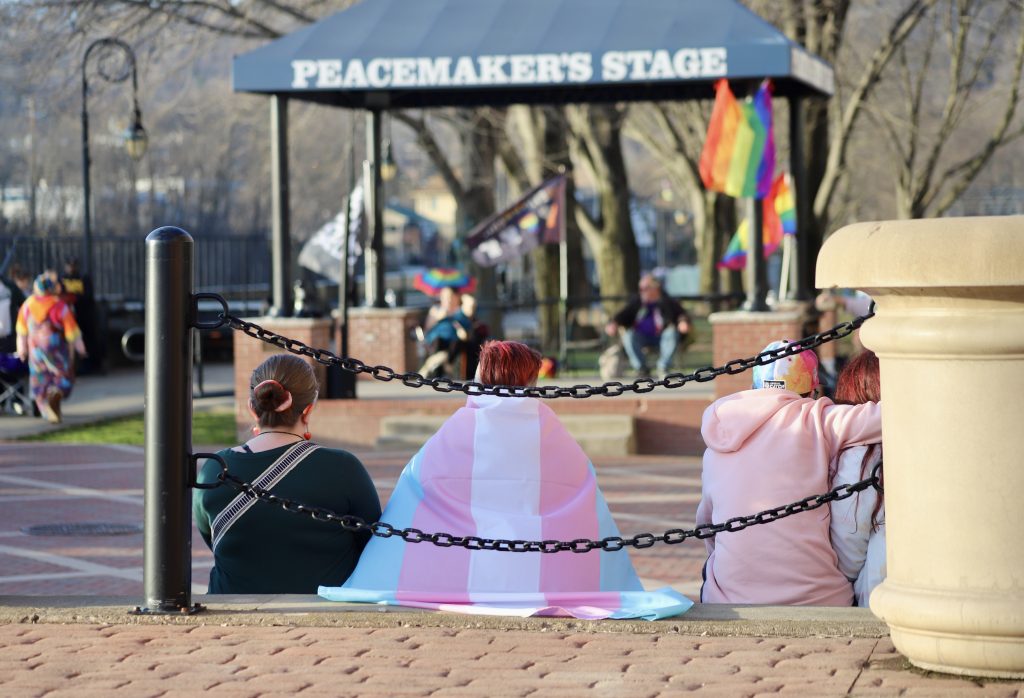Binghamton’s community came together on Tuesday to hold a vigil honoring Nex Benedict, a nonbinary high school student who died in February after a physical altercation with three other students.
Held at Downtown Binghamton’s Peacemaker’s Stage, the vigil was organized by community leaders — particularly members of the local Black, queer and transgender communities. Pride flags decorated the space, and tables beside the stage provided attendees with miniature pride flags, water and snacks. The University’s Q Center tabled, handing out stickers and pamphlets and engaging with attendees.
In February, Benedict, an Oklahoma native of Choctaw Nation descent who used they/them pronouns, was beaten by three classmates in a bathroom at Owasso High School. The next day, Benedict was taken to the hospital, where they reported to police that their classmates beat them until they blacked out and that they had bullied them and their friends in the past. Body camera footage revealed that a police officer advised Benedict’s family to not report the incident, claiming it could open them up to legal liability.
After being discharged, Benedict was rushed back to the hospital later that day, where they were pronounced dead. An autopsy summary released last Wednesday ruled their death as a suicide.
“The best way to support the trans and nonbinary community is to share and provide resources, give them money, display flags of support and make sure to use our privileges to uplift and defend queer and trans people facing discrimination throughout society,” the vigil’s planning committee wrote in a statement. “Additionally, get educated on queer and trans issues and experiences, and listen to the queer and trans community in what they need to safely navigate this world and ultimately thrive.”
The school did not report the fight, resulting in a department of education investigation into concerns that they neglected to follow Title II and Title IX protocols. Oklahoma has some of the strictest anti-trans policies in the country, including laws banning transgender students from using bathrooms that do not match their sex assigned at birth and restrictions on gender-affirming care for minors. The school’s negligence and Benedict’s death amid a history of transphobic policy in the state have sparked national outcry.
“It’s really important [for University students to be involved],” said Cadence Darling, a freshman majoring in French who represented the Q Center at the vigil. “It showed to younger youth and the community that’s older that we’re college students that are there in our presence, and there’s always a space that we want to be involved, and both the college itself and the community at large are supporting each other through it.”
While attendees held candles, speakers shared poems and led prayers, and others shared their experiences as trans individuals and the impact Benedict’s passing had on them. Angelina Blasich, one of the vigil’s hosts, highlighted the emotional necessity of the vigil in an opening speech, addressing the crowd through a large red megaphone.
Blasich read a letter from the mother of Korbin, a trans elementary school student from Elmira, NY. In the letter, Korbin’s mother described the ongoing discrimination Korbin faces from the school district, specifically referencing an incident where her teacher allegedly prevented her from using the girl’s bathroom. According to the event organizers, her testimony showed that Benedict’s experience as a transgender student is not isolated.
“It’s important to hold this vigil to honor [Benedict] and to address the circumstances that ultimately led to [Benedict’s] death,” they wrote in a statement. “But it’s also important that we, as a community, stand up and assert that the queer and trans people of the Southern Tier are valued and supported and have just as much a right to exist here as anyone else. Transphobia is not unique to [Benedict’s] hometown.”
Despite the nature of the tragedy that sparked the vigil, speakers conveyed messages of resistance, resilience and hope. Blasich often addressed the audience as her “party people” and encouraged attendees to talk to each other.
“Celebration is one of the ways that we vigil,” Blasich said. “We celebrate lives lived, and we celebrate what we have to offer each other. I thank you for taking a moment to celebrate the lives of trans children, the lives of their trans parents, the lives of the beautiful trans people who fill our existence and enrich it so magnificently. This vigil space becomes a celebratory space because celebration is a form of resistance.”



